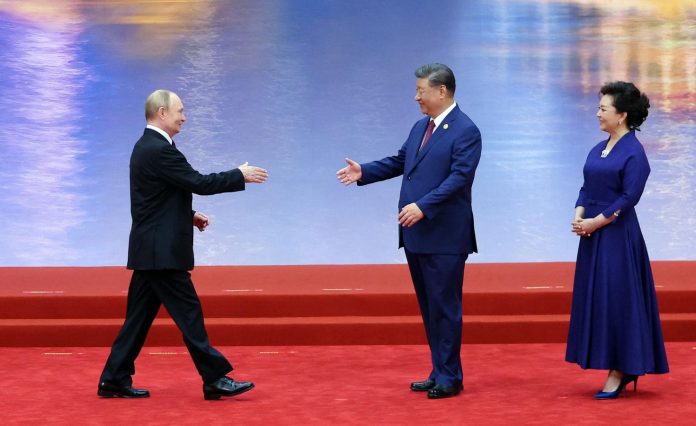In this pool photograph distributed by the Russian state agency Sputnik, Russia’s President Vladimir Putin, Chinese President Xi Jinping and his wife Peng Liyuan attend a welcoming ceremony of the Shanghai Cooperation Organization (SCO) Summit in Tianjin on August 31, 2025. (Photo by Alexander KAZAKOV / POOL / AFP) (Photo by ALEXANDER KAZAKOV/POOL/AFP via Getty Images)
POOL/AFP via Getty Images
Most Americans have probably never heard of the Shanghai Cooperation Organization. But 42 percent of the world’s population are members of this Anti-US club. As the organization meets in Tianjin this weekend, Xi and Putin are rehearsing an anti-U.S. narrative to divide the U.S. from important allies and partners. Xi and Putin used the Shanghai Cooperation Organization summit to tell a coherent fiction:The U.S. and its allies are “militarizing” the Pacific, cyberspace, and outer space. China and Russia are positioning the organization to play a diplomatic and military role that will counter other international organizations that have been traditionally led by the U.S. The U.S. cannot afford to lose the hearts and minds of 42 percent of the world’s population–and must act to counter China and Russia’s dangerous information warfare and legal warfare.
How China Uses the Shanghai Cooperation Organization to Advance an Anti-U.S. Narrative
The Shanghai Cooperation Organization began in 1996 as the Shanghai Five, a border-cooperation organization anchored by China and Russia. The SCO was established in its current form in 2001, as a security cooperation organization. Its members are China, Russia, Kazakhstan, Kyrgyzstan, Russia, Tajikistan, Uzbekistan, India, Pakistan, Iran, and Belarus. Myanmar has recently expressed interest in joining the group. Turkey–a NATO ally–participated in the summit, along with a total of 20 foreign leaders and 10 heads of international organizations.
SCO summits are increasingly used to showcase China’s diplomatic might and partnership with Russia, and to position the organization as a counterweight to NATO and other US alliances. Xi’s opening of the summit framed the SCO as bearing “greater responsibilities” for regional peace and prosperity in light of global uncertainties–positioning the organization for increased power. Putin, too, denounced US alliances. Both China and Russia have decried Japan’s recent increase in defense outlays and military cooperation with the US and its regional allies. In an interview with China’s state Xinhua news, Putin stated that “Japanese militarism is being revived under the pretext of imaginary Russian or Chinese threats.” These potshots echo the narrative that China and Russia have been pushing in other areas of military tensions with the U.S., including cyberspace and outer space. China and Russia have developed a competing UN working group to U.S.-led United Nations initiatives on responsible state behavior in cyberspace. In these U.N. forums, China repeatedly accuses the U.S. of militarizing cyberspace whenever the U.S. asserts that cyberspace operations must follow the law of war. China and Russia have also partnered to promote a treaty on “Preventing an Arms Race in Outer Space” to counter the U.S.’s alleged militarization of outer space. The narrative presented by China and Russia at the SCO also reinforces Putin’s false blame of NATO expansion for the war in Ukraine. Beijing is pre-positioned to amplify its narrative. The PRC uses media partnerships throughout the world and its Digital Silk Road initiative to shape news coverage and public opinion abroad.
TIANJIN, CHINA – AUGUST 25: Staff members learn Russian to enhance international service capacity for the upcoming Shanghai Cooperation Organization (SCO) Summit on August 25, 2025 in Tianjin, China. The summit will take place on August 31 and September 1 in the northern Chinese port city. (Photo by VCG/VCG via Getty Images)
VCG via Getty Images
The U.S.-India Relationship Is Critical–And China Is Making It Complicated
The U.S. cannot afford to lose public opinion among 42 percent of the world’s population – and in one country in particular. The U.S. is deepening its military cooperation with India, the world’s most populous nation. India has a long history of non-alignment dating back to the Cold War, one which continues to influence its foreign policy today. New Delhi initially entered the SCO as a realist hedge and a tool to manage its relationship with Pakistan, but its participation has been cautious, and it has refused to join some organizational initiatives. Amid worsening US-India trade relations, however, Modi traveled to China for the first time since 2018, and the two states pledged greater cooperation.
How China Uses New International Organizations for Legal Warfare
China’s creation of new international organizations to counter U.S.-led initiatives is not new. Legal warfare is one of the pillars of Chinese military and strategic thought. One of its tactics is what I call “institutional lawfare”: creating new international laws and organizations to advance China’s strategic goals. China then uses these organizations, like the New Development Bank and the Asia Infrastructure Investment Bank, to create rules and norms that reinforce China’s political aims–and enable it to write rules the world lives by. In the weeks before the SCO summit, Beijing floated a new international organization for AI–a standing venue where China can set rules and narratives for one of the world’s most important and disruptive technologies. Undoubtedly, it will fold this new AI initiative into its vision of security cooperation for peace and prosperity–however Xi defines those terms.
The U.S. Is Late to the Information And Legal Warfare Fight With China and Russia
When it comes to information warfare and legal warfare, the U.S. is late to the fight. The U.S. has no permanent personnel–civilian or military–dedicated to countering legal warfare full-time. A proposed amendment to the National Defense Authorization Act seeks to rectify this strategic gap. Information warfare is a trickier nut for the U.S. to crack. As I have written elsewhere, the U.S.’s robust First Amendment protections for freedom of speech and information–including the right to receive information–complicate the U.S.’s ability to respond to adversary information warfare. The U.S. government cannot legally have a monopoly on truth, and has no centralized information agency to coordinate U.S. information warfare efforts. The U.S. Information Agency was abolished in 1999 after the Cold War ended. Recent efforts to combat disinformation, including the State Department’s Global Engagement Center and the Department of Homeland Security’s Disinformation Governance Board, have been disbanded. In the past decade, the U.S. military has begun to take information more seriously as a facet of warfighting, but efforts are not well-established or integrated across the Department of Defense.
The U.S. cannot afford to ignore China-led initiatives like the Shanghai Cooperation Organization. U.S. allies and partners are increasingly joining China-led organizations and initiatives. The U.S. must work to counter China’s false stories and to establish its own narrative of being a guarantor of security, freedom, and prosperity for all nations. The U.S. must also work to bolster international law so that China and Russia do not undermine it, and to establish norms, rules, and standards for AI and other emerging technologies. The U.S. cannot afford to lose the moral and legal high ground in any coming conflict with China. It also cannot afford to cede the narrative before the fight begins.
Forbes



